Connecting Third-Party Platforms to CRM

In today’s digital age, businesses rely heavily on customer relationship management (CRM) systems to manage and nurture their customer relationships. CRM platforms provide a centralized hub for storing and organizing customer data, allowing businesses to streamline their sales and marketing efforts. However, to truly maximize the potential of a CRM system, it is essential to connect it with third-party platforms that complement its functionalities.
The Importance of Integrating Third-Party Platforms with CRM
Integrating third-party platforms with CRM can bring numerous benefits to businesses. By connecting these platforms, businesses can enhance their CRM capabilities and gain valuable insights into their customers’ behavior and preferences. Here are some key reasons why integrating third-party platforms with CRM is crucial:
- Streamlined Data Management: Integrating third-party platforms with CRM allows businesses to consolidate customer data from various sources into a single, unified system. This eliminates the need for manual data entry and reduces the risk of data duplication or errors.
- Improved Customer Insights: By connecting CRM with third-party platforms, businesses can gather additional data points about their customers. This includes information from social media platforms, email marketing tools, and e-commerce platforms. These insights enable businesses to create more personalized and targeted marketing campaigns.
- Enhanced Marketing Automation: Integrating CRM with marketing automation platforms enables businesses to automate their marketing processes. This includes lead nurturing, email campaigns, and personalized content delivery. By automating these tasks, businesses can save time and resources while delivering a more personalized experience to their customers.
- Efficient Sales Processes: Integrating CRM with sales platforms, such as customer support software or e-commerce platforms, allows businesses to streamline their sales processes. This integration enables sales teams to access customer data, track interactions, and manage leads more effectively.
Examples of Third-Party Platforms to Integrate with CRM
There are numerous third-party platforms available that can be seamlessly integrated with CRM systems. Let’s explore some popular examples:
Social Media Platforms
Social media platforms, such as Facebook, Twitter, and LinkedIn, play a crucial role in modern marketing strategies. Integrating CRM with social media platforms allows businesses to capture social media interactions and track customer engagement. For example, when a customer interacts with a business’s social media post, the CRM system can automatically create a new lead or update the existing customer’s profile with the interaction details.
Email Marketing Tools
Email marketing is a powerful tool for nurturing customer relationships and driving conversions. Integrating CRM with email marketing tools, such as Mailchimp or HubSpot, enables businesses to sync customer data and automate email campaigns. For instance, businesses can trigger personalized emails based on customer behavior or send targeted email campaigns to specific customer segments.
E-commerce Platforms
E-commerce platforms, like Shopify or WooCommerce, are essential for businesses selling products online. Integrating CRM with e-commerce platforms allows businesses to track customer purchases, order history, and customer support interactions. This integration enables businesses to provide personalized recommendations, offer targeted promotions, and deliver exceptional customer service.
Customer Support Software
Customer support software, such as Zendesk or Freshdesk, helps businesses manage customer inquiries and provide timely support. Integrating CRM with customer support software allows businesses to have a complete view of customer interactions. For example, when a customer submits a support ticket, the CRM system can automatically create a new case and associate it with the customer’s profile, ensuring a seamless support experience.
Case Study: Company X
Company X, a leading e-commerce retailer, decided to integrate their CRM system with various third-party platforms to enhance their customer experience and streamline their operations. By connecting their CRM with their e-commerce platform, they were able to:
- Automatically sync customer data, including purchase history and order details, into their CRM system.
- Segment customers based on their purchase behavior and send personalized product recommendations via email marketing campaigns.
- Provide personalized customer support by integrating their CRM with their customer support software, allowing support agents to access customer information and history in real-time.
As a result of these integrations, Company X experienced a significant increase in customer satisfaction and repeat purchases. They were able to deliver a more personalized shopping experience, resulting in higher customer loyalty and increased revenue.
Statistics on the Benefits of Integrating Third-Party Platforms with CRM
Let’s take a look at some statistics that highlight the benefits of integrating third-party platforms with CRM:
- According to a study by Nucleus Research, businesses that integrate their CRM with other applications see an average increase in productivity by 14.6%. This increase is attributed to streamlined data management and improved collaboration between teams.
- A survey conducted by Salesforce found that 86% of top-performing companies integrate their marketing automation platform with their CRM system. This integration allows them to deliver more personalized and targeted marketing campaigns, resulting in higher conversion rates.
- Research by Aberdeen Group shows that companies with integrated CRM and e-commerce platforms achieve a 32% increase in customer retention rates. This integration enables businesses to provide a seamless shopping experience and personalized recommendations, leading to higher customer loyalty.
Integrating third-party platforms with CRM is essential for businesses looking to maximize the potential of their CRM system. By connecting CRM with platforms such as social media, email marketing, e-commerce, and customer support software, businesses can streamline their operations, gain valuable customer insights, and deliver personalized experiences. Case studies and statistics demonstrate the tangible benefits of these integrations, including increased productivity, higher conversion rates, and improved customer retention. To unlock the full power of CRM, businesses should consider integrating it with third-party platforms that align with their specific needs and objectives.
Discover the power of connecting third-party platforms to CRM with SaasExpert.ca – Your All-In-One Sales and Marketing Platform for small businesses, agency owners, and marketers.
Frequently asked questions about Connecting Third-Party Platforms to CRM.

What are the benefits of connecting third-party platforms to my CRM? 🌟
Ah, right to the good stuff! Connecting third-party platforms to your CRM gives you more capabilities than a standalone CRM can offer. This means you can streamline your workflows and consolidate data across multiple aspects of your business, like marketing, sales, and customer service. The result? A more efficient, agile business with a 360-degree view of each customer, making your interactions more personalized and effective.
What types of third-party platforms can I connect to my CRM? 🎨
Great question! The possibilities are like a color palette—the range is pretty much endless! You could connect anything from marketing automation tools like HubSpot for better lead generation, to e-commerce platforms like Shopify for real-time sales data, to customer service software like Zendesk for centralized support tickets. The objective is to pick platforms that align with your business goals and can seamlessly integrate with your existing CRM software.
How do I ensure that my data remains secure when connecting third-party platforms? 🔒
Security is paramount—no two ways about it. The key lies in doing due diligence before integrating any third-party platform with your CRM. Check out their security certifications, reviews, and most importantly, their data handling and storage policies. Once connected, regular audits can help ensure that the integration doesn’t create any vulnerabilities. Always keep the focus on the secure management of customer data.
Will connecting third-party platforms to my CRM slow it down? 🐢
This is a common concern, and rightfully so. The short answer is that it depends on the quality of the integration and the complexity of the third-party platform. Some tools are designed for lightweight, seamless operation and won’t slow down your system. Others may be data-heavy and could affect performance. It’s crucial to test any new integrations in a controlled environment to understand their impact on your system speed and overall performance.
Can I disconnect a third-party platform if it’s not meeting my expectations? 🔄
Absolutely, you’re not married to these platforms! If a third-party service is not delivering as expected, you can usually disconnect it from your CRM fairly easily. However, be mindful of any data that may be lost in the process and ensure you’ve read up on the disconnection protocols to minimize disruptions. It’s always a good idea to consult with your tech team or the third-party support team to guide you through this process safely.
And there you have it—answers to your pressing questions about connecting third-party platforms to CRM. The bottom line is, when done thoughtfully, these connections can supercharge your business capabilities! 🚀






